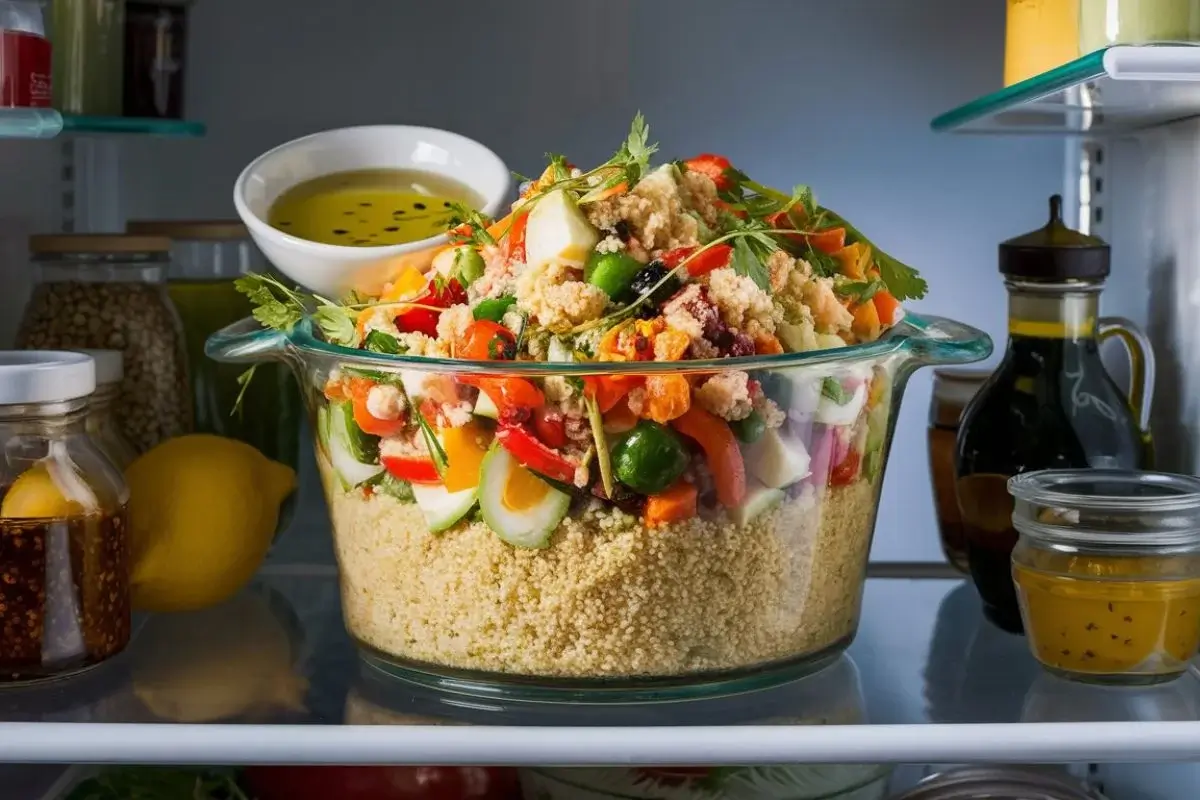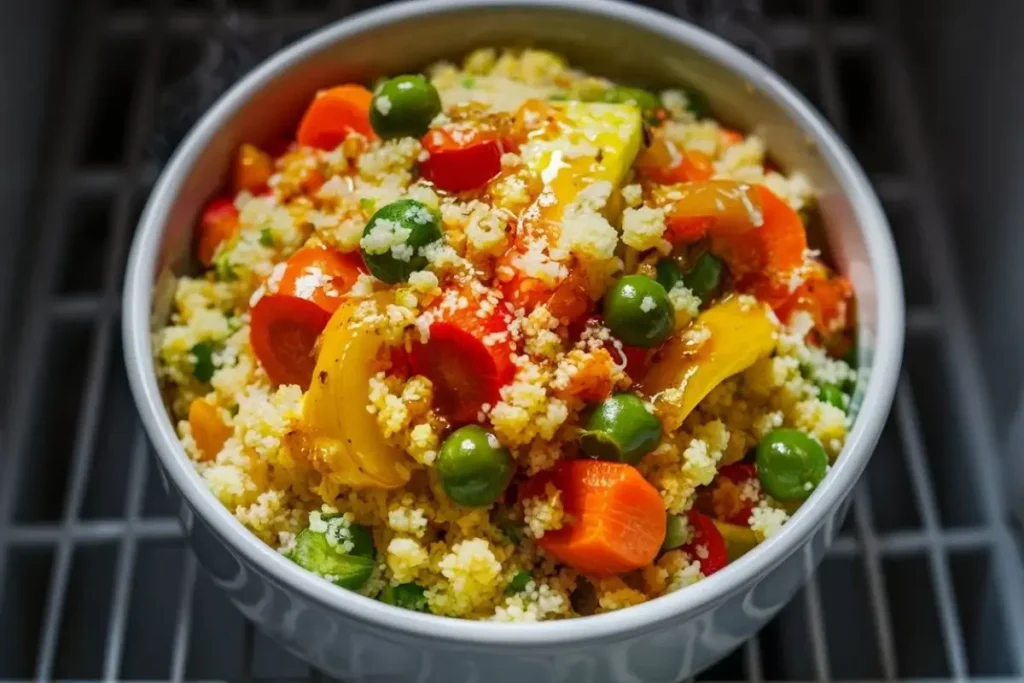In today’s fast-paced world, where meal prepping is a staple for many busy households, understanding the shelf life of everyday ingredients like couscous is essential. Couscous, a versatile and beloved grain product, plays a vital role in numerous culinary traditions, but how long does it actually last in the fridge? This article delves deep into the nuances of storing couscous properly to maintain its freshness and safety, offering practical tips to prevent spoilage. Whether you’re a seasoned chef or a home cook, these insights will guide you through maximizing the shelf life of your couscous and recognizing the signs when it’s past its prime.
Overview of Couscous as a Staple Food
Couscous, a staple in North African cuisine, has charmed its way into kitchens around the globe. This tiny pasta made from steamed and dried durum wheat semolina is not only delicious but also incredibly versatile, serving as a perfect base for a plethora of dishes.
How Popular Is Couscous in Various Cuisines?
Indeed, couscous has become a beloved ingredient across many cultures, integrating seamlessly with various culinary traditions. Its ability to absorb flavors makes it an ideal accompaniment for a range of spices and sauces. In the Mediterranean, couscous is often the star of the meal, adorned with vibrant vegetables and rich spices that speak to the region’s flavorful palate.
Furthermore, the rise of health-conscious eating has positioned couscous as a favored choice among those looking to incorporate more whole grains into their diets. Thanks to its health benefits, including a good source of protein and fiber, couscous supports a balanced diet while providing a satisfying fullness.
Transitioning smoothly into the practical aspects, it’s crucial to know how to keep this staple food at its best. After all, the joy of cooking with couscous hinges significantly on its freshness and quality. In the following section, we’ll explore the pivotal factors that influence the shelf life of both cooked and uncooked couscous, ensuring that every dish you prepare is not only tasty but safe to eat.
Stay tuned as we delve into the essential storage guidelines that every couscous lover should know, making sure that this grain remains a nutritious and delightful part of your cooking repertoire. As we proceed, remember that understanding proper storage is key to extending the couscous shelf life and maintaining its quality.
Freshness and Storage
Understanding how to store couscous properly is vital to ensure it maintains its quality and is safe to consume. Whether uncooked or freshly prepared, the way you handle couscous can significantly affect its longevity.
Uncooked Couscous Shelf Life
Uncooked couscous, when stored correctly, can be a durable pantry staple. To maximize its shelf life, keep uncooked couscous in a cool, dry place away from direct sunlight. Airtight containers are ideal as they protect it from moisture and pests, which can compromise its quality. Typically, uncooked couscous can last up to a year under optimal conditions, maintaining its texture and flavor.
Moreover, understanding the storage environment is crucial. Couscous thrives in stable conditions, so fluctuations in temperature and humidity should be avoided. This stability helps prevent the degradation of the semolina wheat, from which couscous is made, thus preserving its freshness and extending its usability.
Cooked Couscous Refrigeration
Once cooked, couscous should be handled with care to maintain its freshness. It is imperative to refrigerate cooked couscous within two hours of preparation to prevent bacterial growth. Stored in an airtight container, cooked couscous can last in the fridge for 4 to 5 days. Ensuring that the container is moisture-free is key to preventing spoilage.
It’s also essential to cool couscous quickly before refrigeration. Spreading it out on a wide plate or tray can help it cool evenly and more rapidly. Once cooled, transfer it promptly to the fridge, minimizing the time it spends at room temperature.
Signs of Couscous Spoilage
Recognizing when couscous has gone bad is crucial for food safety. The first sign is often the smell; any sour or unpleasant odors are clear indicators that the couscous should not be consumed. Additionally, visual signs such as mold or an unusual change in color can also signal spoilage. Texture changes, such as clumping or sliminess, are tell-tale signs that the couscous has absorbed excess moisture and is no longer safe to eat.
Lastly, if the couscous has a strange taste, it’s best to err on the side of caution and discard it. Always trust your senses—smell, sight, and taste—to guide you in determining the freshness of your couscous.
In our next section, we will dive into the best practices for preparing couscous to ensure it remains fresh and tasty. Remember, proper preparation and storage are the cornerstones of keeping your couscous delicious and safe for consumption. Let’s ensure every grain of couscous served is a delightful experience!
Preparing and Storing Couscous
Achieving the perfect couscous begins with proper preparation and continues with effective storage. Let’s explore the best practices that ensure your couscous is both delicious and stored safely.
Cooking Techniques for Optimal Freshness
To start, cooking couscous properly is fundamental to its quality. Begin by using the correct water-to-couscous ratio, typically one cup of water for every cup of couscous. Bring the water to a boil, add the couscous, then remove it from heat and cover it. After about five minutes, the couscous should have absorbed the water and fluffed up nicely. Fluff it with a fork to separate the grains and prevent any clumping.
Enhancing couscous doesn’t stop at hydration; flavor matters too. Consider toasting the couscous in a skillet with a little olive oil before boiling. This step adds a nutty depth to its flavor, making it even more appealing. For additional taste, cooking couscous in vegetable or chicken broth instead of water can infuse it with extra flavors, enriching the overall dish.
Freezing Couscous for Longevity
Couscous can also be frozen to extend its shelf life, which is particularly useful for meal prepping. To freeze couscous, ensure it is cooled completely to avoid condensation which can lead to ice crystals. Spread the cooked couscous on a baking sheet in a thin layer to cool. Once cool, transfer it to an airtight container or a heavy-duty freezer bag. Properly stored, couscous can last in the freezer for up to three months.
When ready to use, reheat the couscous without thawing; add a little water or broth and warm it on the stove or in the microwave. This method helps maintain its texture and prevents it from drying out.
Storage Solutions for Long-Term Freshness
The key to long-term storage of couscous lies in keeping it dry and cool. For uncooked couscous, use airtight containers and store them in a pantry away from any heat sources. If you live in a humid climate, consider keeping it in the refrigerator to prevent clumping and extend its freshness.
Mistakes to Avoid in Couscous Storage
A common mistake in couscous storage is leaving it at room temperature for too long after cooking. This can lead to bacterial growth and spoilage. Always store couscous in the refrigerator if not consumed immediately. Additionally, avoid using containers that are not airtight as this can allow moisture and contaminants to affect the couscous.
By adhering to these practices, you ensure that your couscous remains fresh and delicious, ready to be enjoyed at its best. Next, we’ll answer some frequently asked questions about couscous storage, providing you with clear answers to common concerns. Stay tuned as we continue to navigate the best ways to handle this versatile grain!
FAQs About Couscous Storage
Navigating the best ways to store couscous often raises questions, especially when considering its shelf life and safety. Here, we address some frequently asked questions that might help clarify any uncertainties.
Does couscous go bad in the fridge?
Absolutely, couscous can go bad in the fridge, especially if not stored properly. Cooked couscous should be eaten within 4 to 5 days when stored in an airtight container in the refrigerator. If it exhibits any signs of spoilage such as a bad smell, discoloration, or sliminess, it should be discarded to avoid the risk of foodborne illness.
Can you eat couscous after 5 days?
Eating couscous after 5 days is risky and not recommended. While some foods may last longer under optimal conditions, couscous tends to absorb moisture and can become a breeding ground for bacteria over time. Always check for signs of spoilage and when in doubt, throw it out to ensure safety.
Is it OK to eat leftover couscous?
Leftover couscous can be safe to eat if it has been properly stored and handled. Make sure it was refrigerated within two hours of cooking and stored in a clean, airtight container. Before consuming, give it a thorough check for any off smells or unusual appearances, and always reheat it to an internal temperature of 165°F to ensure any potential bacteria are killed.
What is the refrigerator shelf life for couscous salad?
Couscous salad, depending on its ingredients, can last in the fridge for about 3 to 5 days. Ingredients such as fresh vegetables or dressings can affect its longevity. Store it in an airtight container and if any ingredients look or smell off before the 3-day mark, it’s best to discard it to avoid any health risks.
These answers should help provide guidance on how to handle couscous safely, ensuring that every serving is delicious and safe to consume. Up next, we will wrap up our comprehensive guide with final thoughts on storing couscous effectively and maintaining its quality for every meal.
Continuing to adhere to these guidelines not only helps in maintaining the freshness of couscous but also ensures that it remains a healthy and enjoyable part of your diet. Let’s proceed to conclude our discussion with key takeaways and best practices for couscous storage.
Conclusion and Best Practices
As we wrap up our comprehensive guide on “How Long Does Couscous Last in the Fridge?”, it’s clear that the longevity and safety of couscous are highly dependent on proper storage and handling. Here are some final thoughts and best practices to ensure your couscous remains a nutritious and enjoyable part of your culinary adventures.
Final Thoughts on Storing Couscous
Couscous, whether cooked or uncooked, demands attention to storage to maintain its quality. For uncooked couscous, the key is keeping it in a cool, dry place, ideally in an airtight container to shield it from moisture and pests. This approach can extend its shelf life significantly, making it a reliable pantry staple.
For cooked couscous, prompt refrigeration is crucial. Ensuring it doesn’t remain at room temperature for more than two hours after cooking can prevent the growth of harmful bacteria. Moreover, when stored properly in the fridge, cooked couscous can safely be consumed within 4 to 5 days, making it a fantastic option for meal prepping.
Best Practices for Couscous Storage
- Use Airtight Containers: Whether storing it dry or cooked, airtight containers are your best bet for keeping couscous fresh.
- Cool It Quickly: Spread cooked couscous on a flat surface to cool it down quickly before storing it in the fridge. This prevents the growth of bacteria that can occur in warmer temperatures.
- Regular Checks: Regularly check your stock of couscous for any signs of spoilage, including smell, appearance, and texture. When in doubt, it’s safer to discard it to avoid health risks.
- Reheat Thoroughly: When using stored couscous, always reheat it thoroughly to an internal temperature of 165°F, which helps kill any bacteria that may have developed during storage.
By following these guidelines, you can ensure that your couscous remains fresh, tasty, and safe to eat. Properly storing ingredients is crucial for dish quality, making the effort worthwhile.
Couscous, a versatile ingredient, enhances your cooking when stored and handled properly. So next time you cook with couscous, remember these tips, and enjoy the delicious, safe, and fresh results.



